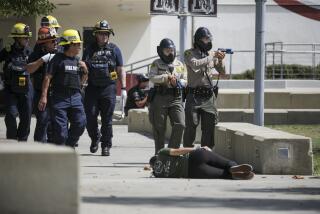Ban Sought on Use of Stun Guns on Campuses
- Share via
SACRAMENTO — Declaring that the Legislature “made a mistake,” Assemblyman Steve Peace (D-Chula Vista) on Wednesday said he has drafted a bill to repeal a law enacted last year that allows teachers and other school employees to carry electronic stun guns on campus to protect themselves.
Peace said the lawmakers were not aware last year that an amendment allowing teachers to use the battery-powered devices had been quietly added to the bill. The law specifically prohibits students and others from bringing stun guns, which temporarily daze and immobilize their victims, onto campuses.
Some Parents Outraged
Peace said he drafted the new legislation at the request of school officials and parents in San Diego. Some parents were outraged when they learned about the new law and expressed fear that the guns will be used to discipline students, although no incidents involving the devices have been reported.
The devices, which resemble a television set’s remote control, have been marketed as self-defense weapons by Texas-based Nova Technologies Inc. for about three years, said a company spokeswoman. Including batteries and a charger, the stun gun sells for about $90.
Three states--Michigan, Rhode Island and Hawaii--have prohibited use of stun guns. Several others, including California, rushed to restrict their use last year after five New York City police officers were indicted for allegedly using the guns to torture four men arrested on drug charges.
Last year’s legislation by Assemblyman Steve Clute (D-Riverside) was California’s first attempt to regulate the purchase, use and possession of the weapons. It passed the Legislature without a single “no” vote. An aide to Clute said Wednesday that in light of the outcry by parents and others, Clute now agrees with Peace that the exception for school personnel should be repealed.
In addition to the school campus provisions, the new law prohibits possession of such weapons by convicted felons, drug addicts and youngsters under 16 without written parental consent.
More to Read
Sign up for Essential California
The most important California stories and recommendations in your inbox every morning.
You may occasionally receive promotional content from the Los Angeles Times.













